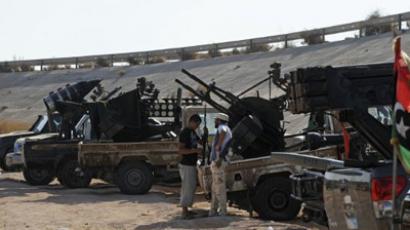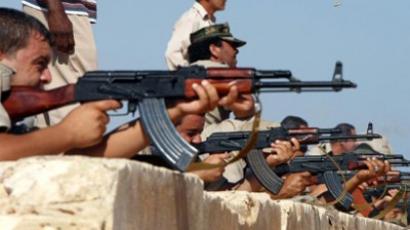UK: champion arms trader or champion of democracy?
As British premier David Cameron ends a triumphant visit to Tripoli to celebrate the end of Muammar Gaddafi's dictatorial rule, British arms dealers are working flat out to keep other brutal regimes in power.
Selling weapons could be a moral minefield, but not at the DSEI (Defense and Security Equipment International), the world’s biggest arms fair and a massive earner for the British economy. The conscience being brandished in Libya has fallen strangely silent as Britain sets out for a day at the fair where international delegates shop for tanks, rocket launchers and missiles.So long as business is being done, it does not seem to matter who is buying. This year’s guest list includes countries like Saudi Arabia and Bahrain, both regimes that violently suppressed pro-democracy demonstrations earlier this year.Bahrain was accused of opening fire on its unarmed citizens in February. Saudi Arabia sent its National Guard in to help, driving armored vehicles made by BAE Systems, the UK’s largest defense company. However, like the British government, the company cannot change its spots. It says there are countries it will not sell to, but that does not include any of those present at the fair.RT spoke to BAE Systems’ demonstrations manager, Per Kjelltoft, to ask him about his company’s policy towards repressive regimes. RT: If a country has been invited here by the British government, it is probably going to be on your list of countries you are able to sell to, presumably?Per Kjelltoft: Makes sense, yes. RT: Do you think it is right to sell to regimes like Bahrain that have repressed democracy protests?PK: I do not have any comments on that one.While representatives of controversial countries eye up the wares on offer, anti-war protesters are doing their best to get a different message across. Activists are angry the fair is going ahead despite the recent crackdowns in Libya and Egypt, both former customers of Britain, which have used British-made weapons against their own people.“We are paying the price now in the Mediterranean because we have sold weapons to nearly all the countries that are now experiencing the Arab Spring,” said Bruce Kent, of the Campaign for Nuclear Disarmament. “I think it is short-sighted, it is bad for this country. It does not make money, it makes wars.”This year’s shoppers include 14 countries branded authoritarian by human rights groups, a fact the government came clean on just one day before trade began. “I am sure they are very embarrassed because on the one hand, in February, David Cameron was going to Egypt walking around Tahrir Square, proclaiming his belief in human rights and freedom and democracy,” said Kaye Stearman from Campaign Against the Arms Trade. “And the next stop was Kuwait, and it turned out he was travelling with eight arms company executives and the whole purpose of the trip was trade and one of the main trades they were trying to promote was weapons trade to the Middle East.” The government says it is tightening restrictions on who can buy weapons that could be used for repression. It claims an invite to the DSEI does not guarantee an export license. Still, defense is big business for Britain. It generated 22 billion pounds for the economy last year, making the UK the second-biggest weapons exporter in the world, and with money like that up for grabs, turning customers away empty-handed may indeed prove difficult.














